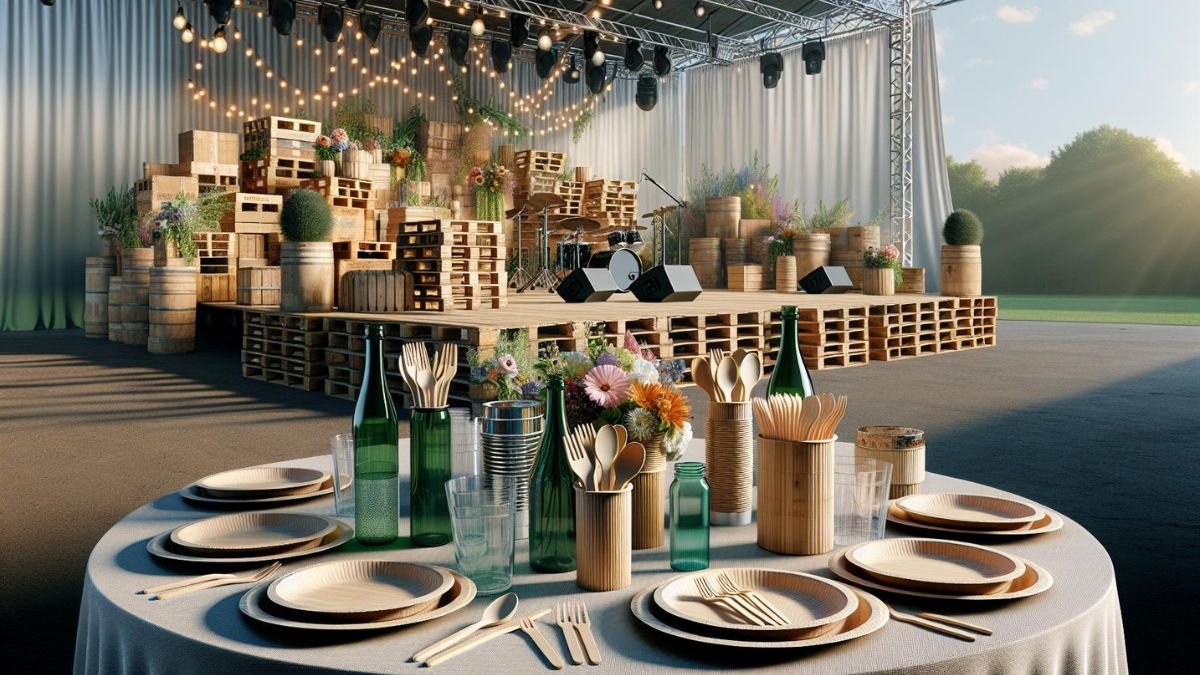Festivals and large events are fun only when they are entertaining and memorable. However, it’s often seen that large events increase waste, energy wastage, and negatively impact the environment. Therefore, the need for eco-friendly festival planning has increased in today’s times.
In this blog, we’ll explore 10 key points on how you can make your festival or event sustainable, environmentally friendly, and enjoyable.
Prioritize the Environment When Planning an Event
The first step is to keep the environment in mind when planning your event.
- When choosing the size and location of your event, consider minimizing the impact on the local environment.
- Choose an open space that utilizes solar lighting and natural ventilation.
- The choice of materials and decor for your event should be environmentally friendly.
Tip: Incorporate small steps like reusable decorations, natural lighting, and waste segregation during planning.
Ways to Reduce Waste
The biggest problem at festivals is waste accumulation. To reduce this:
- Use biodegradable or reusable items instead of single-use plastic.
- Provide compostable plates and cups at food stalls.
- Provide clear signage and assign staff for waste segregation.
Eco-Friendly Tip: Install composting stations to create natural fertilizer from organic waste.
Energy Saving and Use Renewable Sources
Energy consumption also increases the environmental impact of large events.
- Use LED lights and solar-powered lights.
- Efficiently set up sound and light systems.
- Use solar panels or battery backups if possible.
Tip: Adopt energy-efficient practices during peak hours to reduce energy consumption.
Natural and Reusable Items in Decoration
To make decoration eco-friendly:
- Use paper, bamboo, jute, or recycled materials.
- Avoid balloons and plastics.
- If it’s a theme-based event, use seasonal and local flowers.
Creative Tip: Adopt DIY decor ideas; this will reduce costs and minimize environmental impact.
Food and Beverages – Choose Local and Organic
Sustainability is crucial in food stalls or catering.
- Choose local vendors to reduce your transportation carbon footprint.
- Offer organic and seasonal food products.
- Use less plastic and more eco-friendly packaging in packaged food.
Tip: Encourage the use of reusable bottles at water stations.
Transportation and Logistics – Green Travel
Attendees’ travel during the festival also increases the environmental impact.
- Arrange public transport or shuttle services.
- Encourage carpooling.
- Promote electric vehicles or bicycles.
Tip: Parking and traffic management plans should be sustainable and organized.
Digital Promotion – Reduce Print Waste
Use digital tools for event promotion:
- Use social media, email campaigns, event apps, and QR codes.
- Use flyers, posters, and print media sparingly.
- Eco Tip: Provide attendees with digital ticketing to reduce paper waste.
Spread Environmental Awareness
The primary objective of an eco-friendly festival is to raise awareness.
- Hold sustainability workshops and seminars during the event.
- Promote environmentally friendly practices in signage and announcements.
- Encourage attendees to practice waste segregation and use reusable items.
- Tip: Organize fun eco-activities for kids and youth.
Selection of Sponsorship and Partners
- Event sponsors and partners should also be eco-friendly.
- Choose brands or companies that adopt green practices.
- Include sustainability guidelines in the sponsorship agreement.
- Promotional materials should also be eco-friendly.
Tip: Collaboration with corporate sponsors should have clear environmental goals.
After the Event – Cleanup and Waste Management
A cleanup plan and waste disposal are crucial after the event.
- Collect recyclable, compostable, and non-recyclable waste separately.
- Provide proper training to volunteers and staff.
- Include sustainability metrics in event evaluation.
Tip: Leave the venue in better condition after cleanup and engage the local community.
Conclusion
Eco-friendly festival planning isn’t just a trend these days, it’s also a responsibility.
- It makes your event not only fun, but also memorable and environmentally friendly.
- Small steps like waste segregation, energy efficiency, local food, and digital promotion can reduce major environmental impacts.
- Awareness and participation from attendees, sponsors, and volunteers can make a festival even more sustainable.
If you follow the 10 points above, your event will be both modern, fun, and eco-friendly. This is not only good for the environment but will also earn you recognition as a sustainable event organizer.
